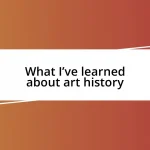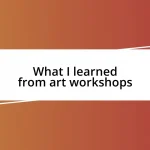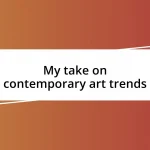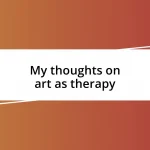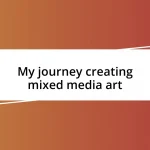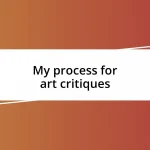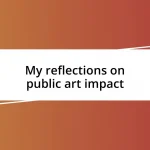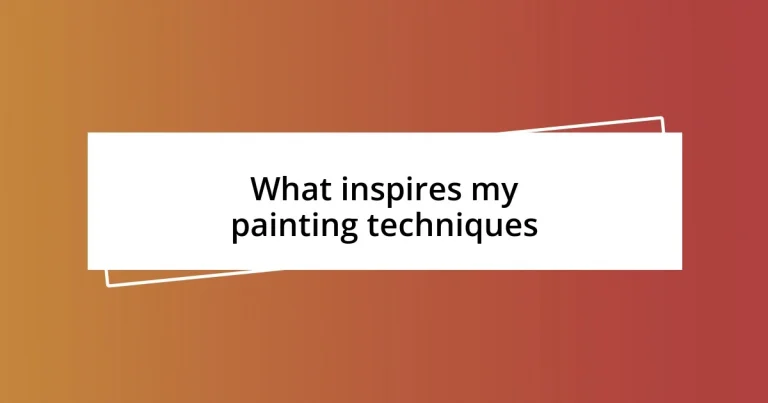Key takeaways:
- Nature and travel profoundly inspire the author’s painting techniques, encouraging experimentation with textures and colors.
- Personal challenges and emotional experiences often lead to breakthroughs in artistic expression and technique development.
- Influences from culture, literature, and masters’ techniques shape the author’s artistic identity and narrative style in painting.
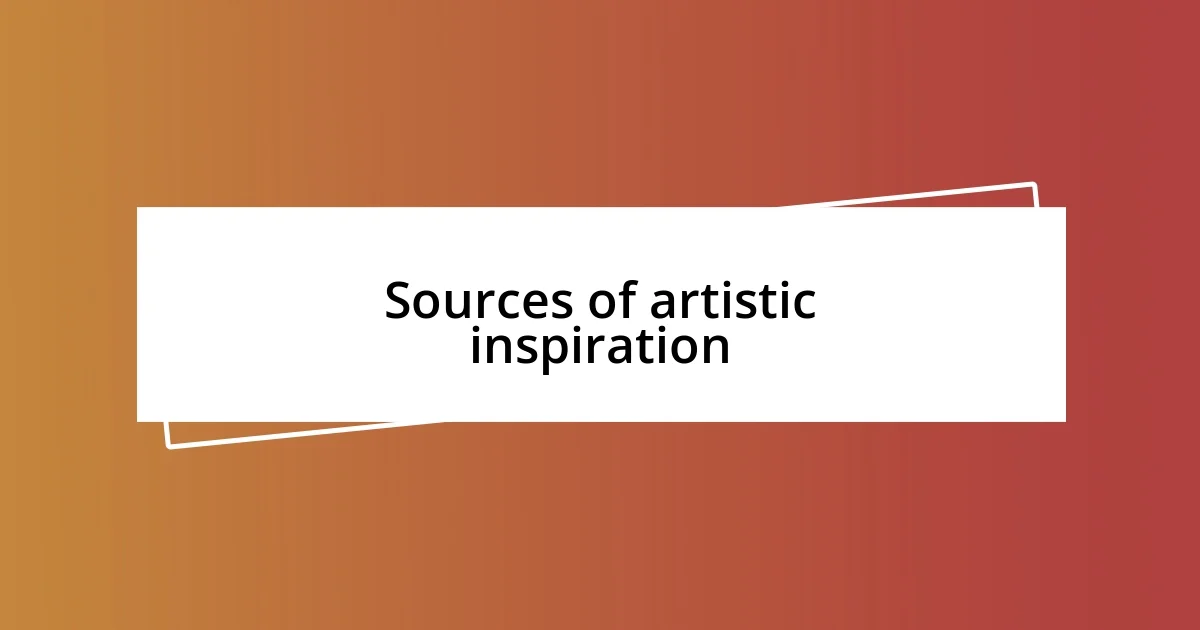
Sources of artistic inspiration
When I think about the sources of my artistic inspiration, nature often tops the list. I vividly recall a trip to the Himalayas, where the sheer majesty of the mountains left me breathless. The colors of the sunsets and the delicate dance of shadows inspired me to experiment with textures and layering in my paintings. Have you ever stood before something so stunning that you could almost feel it moving through your brush?
Travel also serves as a profound source of inspiration for me. Each journey introduces me to new cultures, art forms, and perspectives. I remember wandering through the bustling streets of Marrakech, where the vibrant colors and intricate patterns captivated my imagination. It makes me wonder, how many stories can one canvas hold, reflecting the myriad experiences we’ve gathered along the way?
Emotions play a crucial role in my artistic process as well. I channel feelings of joy or melancholy into my work, transforming them into visual narratives. For example, during a particularly challenging period, I found solace in painting abstract forms, using bold colors to express my inner turmoil. Isn’t it fascinating how our emotional landscapes can shape the very art we create, turning personal struggles into something universally relatable?
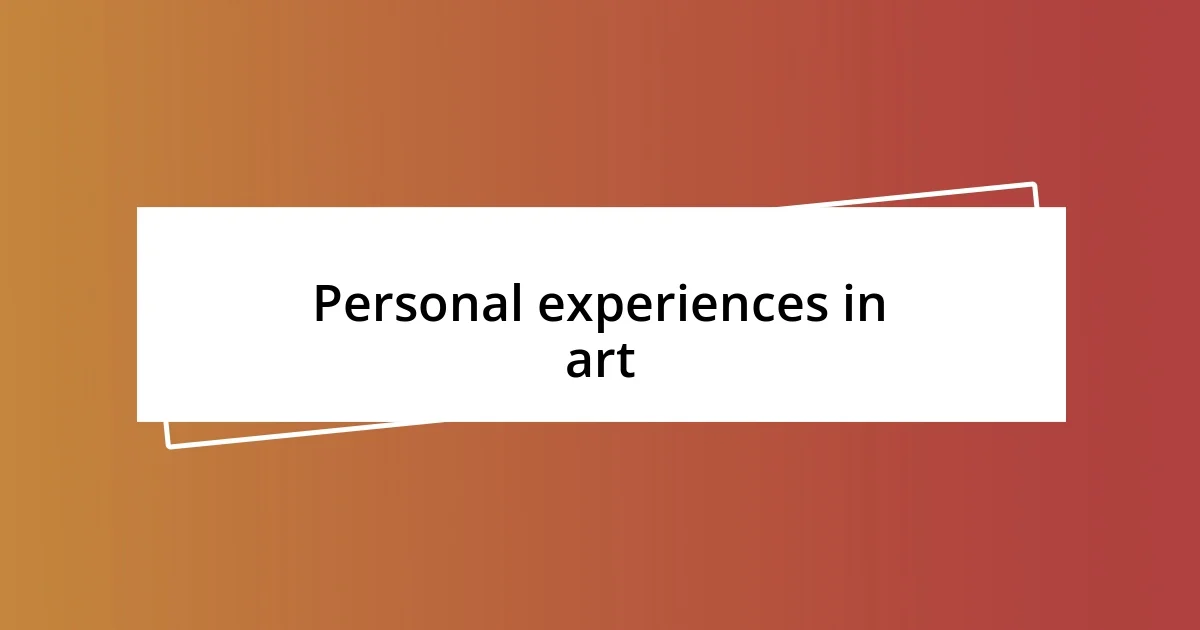
Personal experiences in art
Reflecting on my personal experiences in art, I find that the moments I’ve faced challenges often lead to profound breakthroughs in my painting techniques. I remember a rainy afternoon when I felt particularly uninspired; I grabbed a few colors and started to play with drip techniques, letting the paint flow freely. To my surprise, what emerged was a chaotic yet beautiful depiction of my mood, illustrating how sometimes, embracing uncertainty can breathe life into creativity.
- My first art exhibit was a whirlwind experience; nervous energy turned into vibrant brush strokes that captured the essence of my feelings that day.
- A mentor once advised me to paint with my eyes closed for a few minutes, which turned out to be a liberating exercise that unlocked a new sense of spontaneity in my style.
- During a particularly joyous celebration, I painted surrounded by friends, capturing laughter and warmth; it became one of my favorite pieces because of the shared memories infused in it.
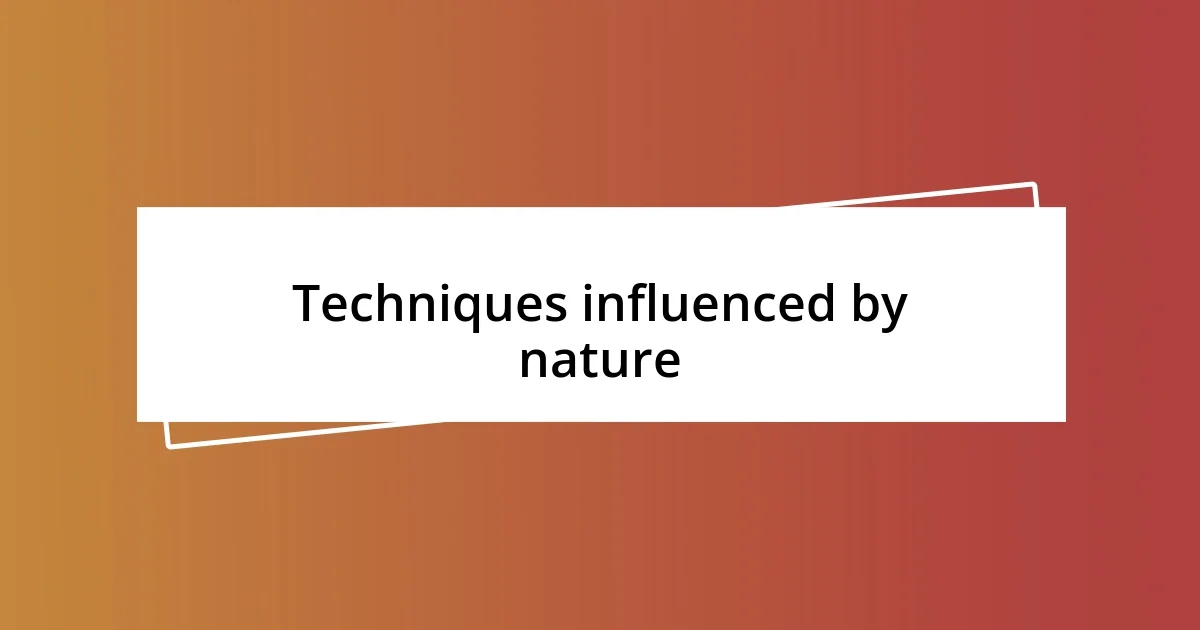
Techniques influenced by nature
When I immerse myself in nature, I often discover new painting techniques that feel like an extension of the environment around me. For instance, while hiking through a dense forest, I was captivated by the play of light filtering through the leaves. This moment led me to explore the technique of glazing, whereby I layer transparent colors to mimic how sunlight dances on foliage. It’s amazing how the natural world can teach us about subtlety and depth.
On one memorable day at the beach, I experimented with palette knives to capture the rough texture of sandy shores and the fluidity of ocean waves. The process was exhilarating; it was as if the sea itself guided my hand, pushing me to replicate its movement on canvas. Have you ever felt that connection to nature that inspired a creative breakthrough? I certainly have, and it’s moments like these that ignite my passion for painting.
I find that observing seasonal changes profoundly influences my color palette. In autumn, I gravitate toward warm earth tones, whereas spring draws me towards soft pastels. This shift in inspiration encourages me to adapt my techniques accordingly—like experimenting with dry brushing to create softer edges that mimic the gentleness of blooming flowers. Nature is not just a backdrop for my work; it actively shapes my approach and challenges me to evolve as an artist.
| Nature Inspiration | Painting Technique |
|---|---|
| Sunlight through leaves | Glazing |
| Ocean waves | Palette knife technique |
| Seasonal colors | Dry brushing |
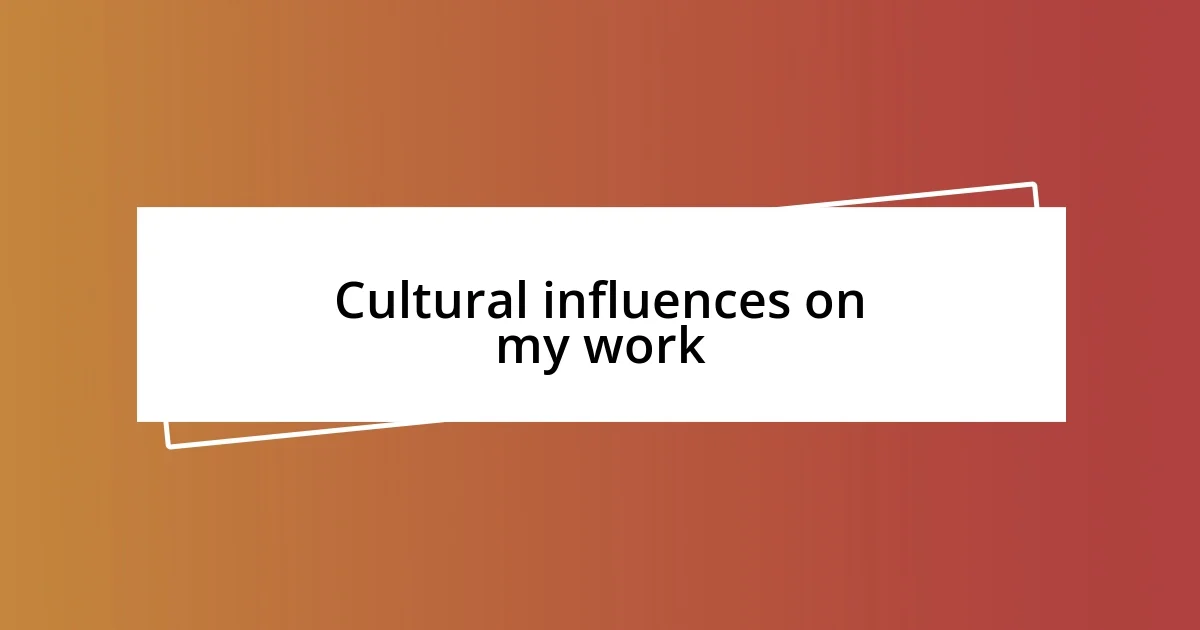
Cultural influences on my work
Cultural influences weave a rich tapestry into my work, shaping both my identity as an artist and the techniques I explore. Growing up in a multicultural environment, I was always fascinated by the vibrancy of diverse traditions. One memorable experience was attending a local festival where traditional dancers adorned in intricate costumes captivated me. Inspired, I began experimenting with bold colors and patterns in my paintings, allowing those cultural narratives to seep into my brush strokes. Have you ever felt that a particular culture spoke to you in a way that inspired your creativity? For me, it was a turning point.
The patterns and textures from my heritage often find their way into my work, much like an artist’s signature. I recall spending summers with my grandmother, who taught me the art of fabric dyeing through the ancient Japanese technique of shibori. This method of folding and tying fabric fascinated me, leading me to explore similar concepts in painting, where I create dynamic layers through certain techniques like lifting or scraping paint. It’s extraordinary how even our family traditions can shape our artistic expression.
Moreover, literature and storytelling from various cultures have deeply influenced my themes and the emotions I convey. I remember reading a beautiful poem about the connection between nature and spirit during a quiet evening. It compelled me to capture that essence on canvas, prompting me to use ethereal blues and golds evoking a sense of otherworldliness. Have you ever had a piece of literature inspire your own artistic journey? This blend of cultural inspiration not only drives my creative process but also enriches the viewer’s experience, inviting them to embark on their own exploration of these shared narratives.
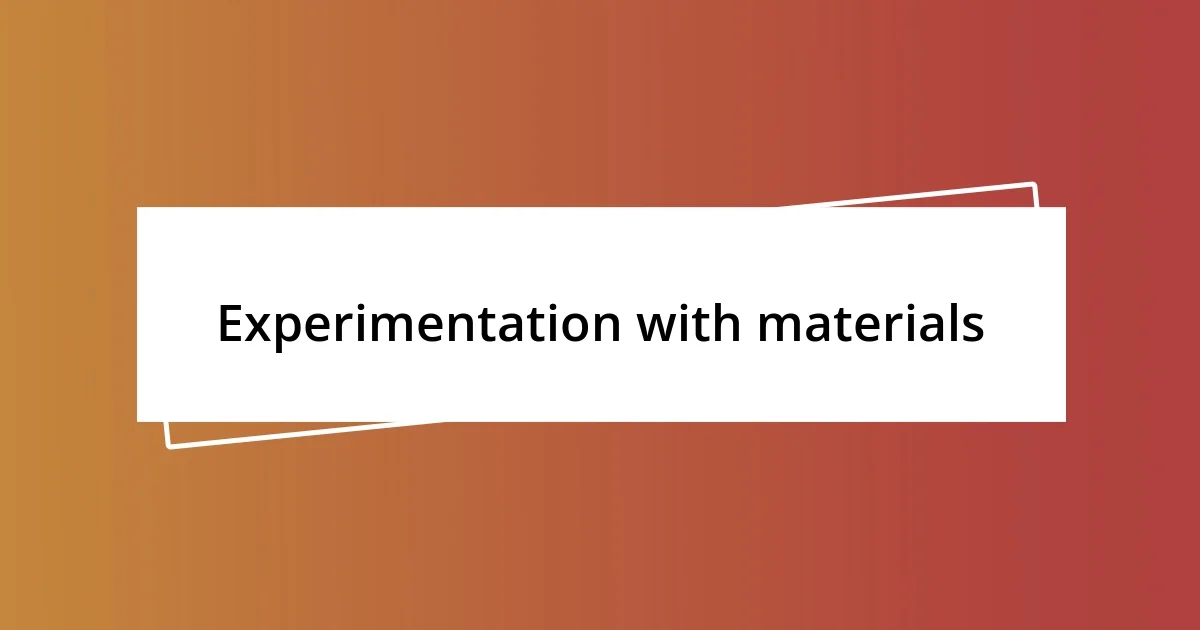
Experimentation with materials
Experimentation with materials is often where the magic happens for me. I vividly recall the day when I decided to mix sand into my acrylics after a beach outing. The result was exhilarating—my colors transformed with a gritty texture that reminded me of coastal landscapes. It was a breakthrough moment that showed me how unconventional materials can breathe new life into my work. Have you ever tried incorporating something unexpected into your creative process?
I’ve found that trying out different types of brushes can yield surprising results. One day, I grabbed an old toothbrush, not knowing how it would impact my painting technique. To my delight, I discovered a fun splattering technique that mimicked the random beauty of nature’s motifs, like raindrops dancing on a window. It sparked a new direction in my art, emphasizing spontaneity and playfulness. This experience taught me that sometimes, the right material can unlock hidden creative paths.
There are times I go to an art supply store just to see what catches my eye. One visit led me to unconventional items like fabric swatches and metallic foils. Using these materials, I created a series that played with light and texture in ways I never anticipated. It highlights how essential experimentation is—it’s not just about the end result, but the journey of discovery that can reshape our artistic identity. Have you felt that excitement of finding a new material that changes everything for you? It’s exhilarating, and it keeps my passion for painting alive.
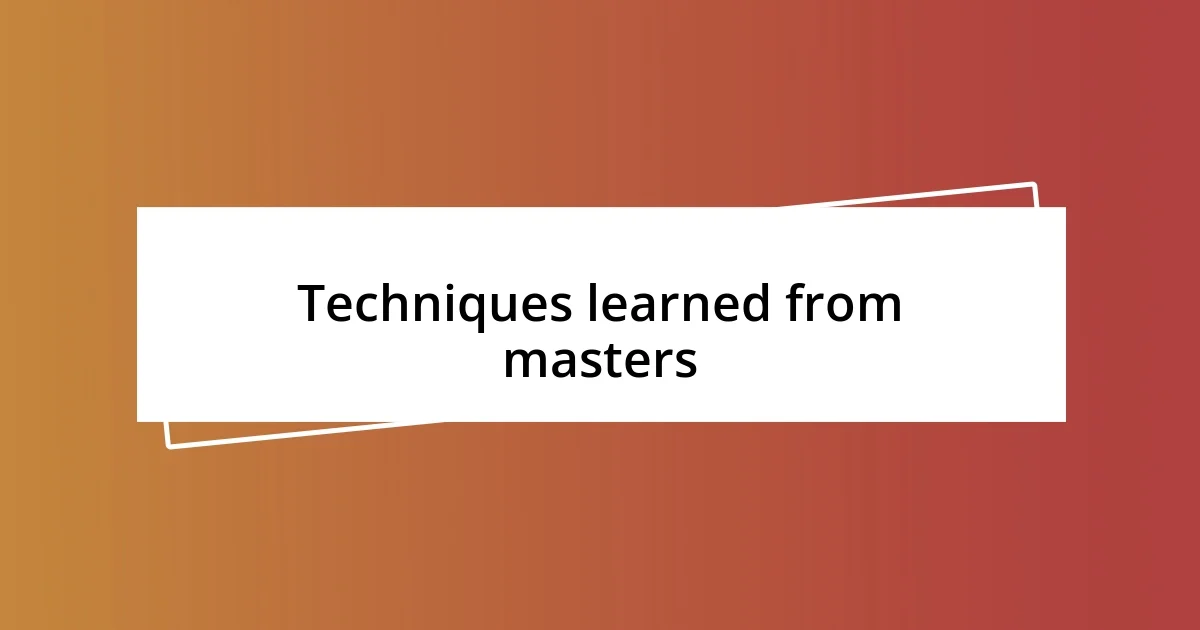
Techniques learned from masters
Learning painting techniques from masters has profoundly shaped my artistic journey. I remember the first time I studied Impressionism—watching how light danced across brush strokes inspired me to explore capturing fleeting moments in my own work. Why do you think some techniques resonate so deeply with us? For me, it’s about connecting with the feelings and insights of the artists who walked the same path before me.
One particular afternoon, I digested the expressive techniques of Van Gogh, noting how he used vibrant colors to convey emotion. I tried to apply his impasto technique—laying paint thickly on the canvas—to my own landscapes. What thrilled me was the way my paintings started to physically embody the emotions I felt while creating them. It was as if I was able to plug into his passion, reviving my own enthusiasm for my subject matter. Have you ever felt that electric connection to an artist’s style?
Additionally, I’ve found myself experimenting with the glazing techniques of the Old Masters, where layers of transparent paint build depth and luminosity. Once, while layering colors, I experienced a moment of unexpected harmony that radiated from the canvas. It reminded me of how crucial patience is in our craft; just like a finely aged wine, great art often takes time to develop. Have you ever caught yourself mesmerized by the unfolding of your own creative process? That slow journey of layering not only challenges me but also allows my inner artist to blossom in ways I never imagined.
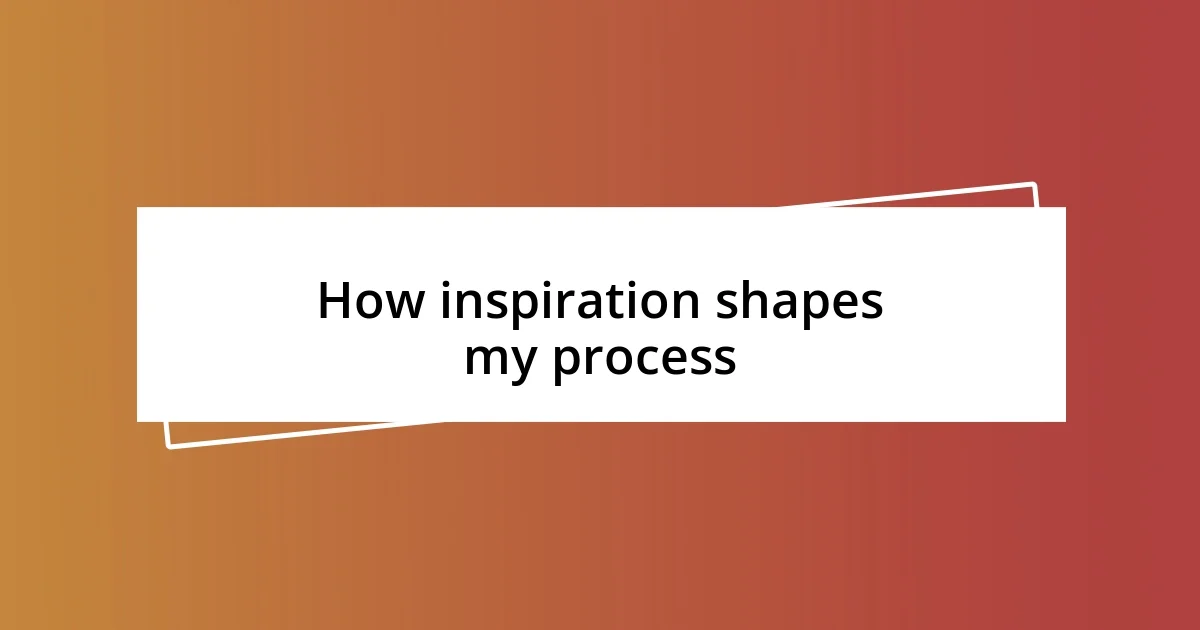
How inspiration shapes my process
Inspiration is the heartbeat of my artistic process, often guiding my brushstrokes in unexpected directions. One rainy afternoon, as I gazed out my studio window, the blurred outlines of the world beyond caught my attention. That moment sparked a series of paintings where I embraced softer edges, tapping into the ethereal quality of nature’s transient beauty. Have you ever let a fleeting moment morph your creative focus? Those tiny shifts often unveil greater depths in our art.
I find that revisiting certain artworks or genres can reignite my passion and lead to fresh interpretations. After studying the serene landscapes of the Hudson River School, I felt a compelling urge to translate my own local scenery onto the canvas. There’s something profoundly fulfilling about transforming inspiration into personal expression; it’s like paying homage to the past while constructing a new narrative. How does the influence of past artists resonate with your own creative endeavors?
At times, inspiration strikes spontaneously, often when I least expect it. I remember walk through a bustling market; the vibrant colors and lively patterns of fabrics fueled my creativity in an instant. That day, I sketched designs based on the textiles, which evolved into a series blending abstraction with vivid color palettes. Don’t you think those unplanned bursts of inspiration are what make our artistic journeys so uniquely ours? They inject life into our work, constantly reminding me that inspiration can show up anywhere if I’m open to it.

